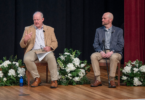Athens, Ga. – Michelle Henry Barton, a University of Georgia College of Veterinary Medicine professor known as an inspiring teacher and mentor and an accomplished researcher, has been appointed to a Fuller E. Callaway Professorial Chair.
Barton is the latest in a long line of UGA faculty members to hold a Callaway Chair since the program was established in 1968. The chairs are funded through the Fuller E. Callaway Professorial Chairs Trust, established by the Callaway Foundation, Inc., and administered by Bank of America. The trust, which was created to help colleges and universities in Georgia retain or recruit superior faculty members, provides $60,000 annually to support the professorship.
Callaway professors are chosen primarily for excellence in instruction, but must also have a distinguished record in scholarship and must provide valuable service to students and faculty outside their area of specialization.
“Some of the University of Georgia’s most distinguished faculty members have held Callaway Chairs over the past four decades, and it’s a pleasure to have Michelle Barton join this select group,” said UGA President Michael F. Adams. “Through these endowed chairs the Callaway Foundation has strengthened, in a profound and lasting way, the quality of teaching and scholarship at the University of Georgia and at educational institutions throughout the state. We are deeply grateful for the foundation’s contributions to educational excellence in Georgia.”
Barton is a Josiah Meigs Distinguished Teaching Professor in the veterinary medicine college’s department of large animal medicine with an adjunct appointment in the college’s department of physiology and pharmacology. She joined the college as a clinical resident in 1986 and in 1990 earned a Ph.D. in physiology and joined the faculty in 1993. She became a full professor in 2000.
Arnett C. Mace Jr., senior vice president for academic affairs and provost, said Barton exemplifies the best of UGA’s teaching corps.
“Dr. Barton has the intellectual, personal and professional skills that can change an ordinary classroom or lab into a dynamic and exciting learning environment,” Mace said. “The great respect, admiration and appreciation accorded by her students, colleagues and peers leave no doubt that she not only meets but far exceeds the high standards required of a Callaway Chair recipient.”
A specialist in large animal internal medicine, Barton is one of the college’s most innovative and popular teachers and carries one of the heaviest teaching loads, teaching in up to 10 courses each year in the first three years of the professional veterinary curriculum, said Sheila Allen, dean of the college.
She also teaches fourth-year students in the large animal medicine clinical rotation, is a skilled and caring clinician in the college’s large animal teaching hospital and is internationally known for her research and publications, according to Allen and Andrew Parks, head of the large animal medicine department, who jointly nominated Barton for the Callaway Chair.
“Dr. Barton is truly a role model,” Parks said. “She is an exceptional example of an accomplished educator, clinician and researcher and is fully deserving of the high honor of holding a Callaway Chair.”
Barton engages students through several teaching techniques but relies heavily on a “story” approach in which she describes an animal’s medical problem, then asks real or rhetorical questions that encourage students to understand the problem and decide on a diagnosis and treatment.
She is innovative in using technology for teaching and was one of the first instructors in the college to use Web-based technology in the classroom. Barton and three other faculty members received a grant to install some of the first equipment that integrates student responses to posed questions into classroom instruction.
Barton also developed computer-based teaching aids to help students learn to recognize sounds that may be associated with heart disease in horses such as cardiac arrhythmias and murmurs. She was part of a team that created a CD that shows a virtual three-dimensional transparent view of a horse’s abdominal organs, allowing students to understand how diseases such as equine colic affect an animal.
Barton consistently earns excellent ratings on student evaluations and has won several awards for teaching excellence including the Josiah Meigs Award, UGA’s highest teaching honor. She is a member of the UGA Teaching Academy and was a Senior Teaching Fellow.
Barton is widely known for her research on endotoxemia and diseases in newborn animals. She has published 60 articles in professional publications, written 31 book chapters and made more than 75 presentations at professional meetings in the U.S. and abroad. She has been either the lead investigator or a collaborator on about 45 grants for research and teaching totaling more than $3.25 million.
She has been a mentor to many students conducting research projects and has helped introduce students to clinical science through summer research programs. She has trained 75 interns in the college and mentored 14 residents.
As a faculty member in the teaching hospital, when on clinics she typically spends 50-60 hours a week overseeing and advising students who treat animals and checking on their work. She also is often the first person students and colleagues turn to for help in diagnosing or treating a difficult internal medicine case in an animal, Allen said.
Barton is active in several professional organizations and this year became president of the Specialty of Large Animal Internal Medicine in the American College of Veterinary Internal Medicine.




